The holy war is not only fought in Syria, Iraq or Libya. He is also more and more boldly visiting Europe. Islamic extremists strike big metropolises and take part in European wars. The battalions dominated by them are fighting just outside Poland.
Islamic fighters first appeared in Europe in the 1990s. They entered the jihad to fight for Chechnya's independence.
"Local" jihadists from Dagestan, Ingushetia, Ossetia, Azerbaijan and Russia have arrived in this small Islamic country struggling with Russian aggression. Brothers from the Middle East countries:Saudi Arabia, Turkey, Jordan, Egypt, as well as Afghanistan and Pakistan also fought at their side.
The presence of Islamic extremists was particularly noticeable during the Second Chechen War in 1999-2009. The Russian federal army then occupied most of the republic's territory. The defenders' forces went underground, and the fighters began to organize spectacular and bloody terrorist attacks. They were responsible for the occupation of the Dubrovka theater in Moscow in 2002 and the school in Beslan in 2004. Each of these attacks took the lives of hundreds of victims.
Thanks to radical Islamists and instructors from Arab countries, the Chechen underground gradually became radicalized. The breakthrough came in 2007, when the Caucasus Emirate was proclaimed in place of the Chechen Republic of Ichkeria, as the desired independent state was to be called. The goal of the fighters was not only the freedom of Chechnya. They dreamed of creating an Islamic state throughout the North Caucasus . The emirate was to embrace the Caucasian republics that today lie within the borders of the Russian Federation. Apart from Chechnya, it was also Dagestan, Ingushetia, Ossetia, Kabardino-Balkaria and Karachay-Cherkessia.
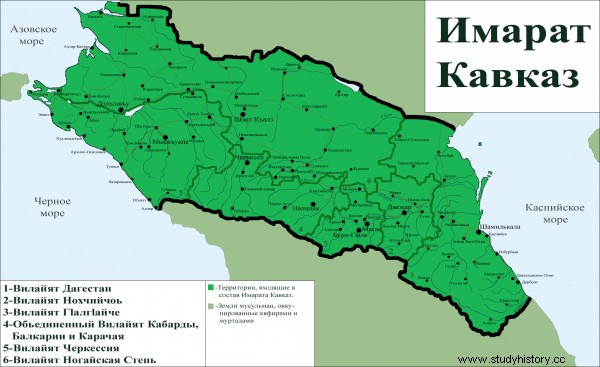
The Caucasus Emirate was to cover large tracts of land from the Black Sea to the Caspian Sea. Map by Pietervhuis, license CC BY-SA 4.0, 3.0, 2.5, 2.0 and 1.0.
To implement the intention to create the Caucasus Emirate, jihadists have waged and continue to fight using terrorist methods. Among other things, they carried out an attack on the Moscow metro in 2010, killing at least 39 people. They also attacked the Domodedovo airport near Moscow in 2011, the city bus in Volgograd in 2013 and the Press House in Grozny in 2014.
However, the main place of activity of Muslim extremists fighting for the cause of the Caucasian cause is still the territory of the planned Islamic state. The media from time to time inform about their next attacks. Fighters target police stations, offices, public transport or public facilities. They are most active in Chechnya, Dagestan, Ingushetia and southern Russia.
Jihad in the big cities of Europe
Islamic jihadists are also waging their struggle in Western European countries. Its goals are different, but the form remains the same:terrorist attacks against ordinary inhabitants of large metropolises. The loudest and bloodiest ones took place in 2004 in Madrid, in 2005 in London, 2015 in Paris and 2016 in Nice.
It was France that became the first target of the attacks . The black series began when, on January 7, 2015, an attempt was made on the editorial office of the satirical Parisian weekly Charlie Hebdo. Brothers Said and Cherif Kouachi shot 12 people, including the magazine's lead artists.
The Islamists struck Paris for the second time a few months later. On November 13, 2015, they carried out several coordinated attacks around the Stade de France, in the bars and restaurants of the X and XI districts, and in the Bataclan concert hall. 130 people were killed in the bloody attacks and more than 350 were injured. The Islamic State pleaded guilty to the attacks. It was the most tragic event to hit France since the Second World War.
Ukraine - a Jihadist outpost
Jihadists can strike anywhere, but there is one place in Europe where they feel particularly safe:a war-torn Ukraine. Still struggling with post-communist baggage, this country is a great choice for those who need to hide. And an important stop for brothers who are fighting for the Caliphate, the free Caucasus or Iraq. They can buy legal Ukrainian citizenship here for $ 15,000 . Which, as Marcin Mamoń explains in his book "War of the brothers," opens many doors:
Ukraine is not a country in the EU, but may be considered a gateway to Western Europe. Poland issues visas for ninety days to almost all Ukrainians who request them without any difficulties. At the same time, Ukraine is one of the most corrupt, disorganized and devastated countries in the world - there is a war there and state institutions are disappearing.
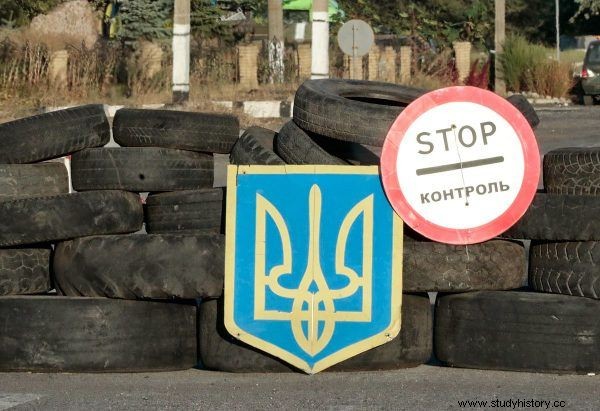
"Ukraine is one of the most corrupt, disorganized and devastated countries in the world," and plunged into war with Russia. No wonder Islamic militants are drawn there. The photo shows the checkpoint in Donbas in 2014 (photo:ВО «Свобода», license CC BY 3.0).
But Ukraine is not only a safe base for jihadists. They take an active part in the ongoing war there. They support Ukrainians in the east of the country in their fight against Russian separatists. In this way, they repay the help that Ukrainian nationalists gave Chechnya in the 1990s. The ranks of the Chechens against Russia were joined by the UNA-UNSO unit "Wiking" led by Oleksandr Muzyczenko.
A Chechen battalion named after Dzhokhar Dudayev is operating in the Donbas on the Russian-Ukrainian border. At the same time, as Marcin Mamoń emphasizes in "War of the Brothers", the Ukrainian authorities did not support the battalion with money or weapons. Its Chechen organizers, wanting to fight the separatists, had to get everything on their own. They did it where Islamic brothers felt best - in a world that was illegal and not controlled by state structures ...
Rob the casino
In practice, obtaining funds enabling the functioning of Dudayev's battalion consisted in ... robbing illegal casinos in Kiev . Fighters dressed in uniform rushed inside, gutted cash registers and slot machines. The money obtained in this way was spent on food, weapons, shoes, vests and other military equipment needed to fight at the front.
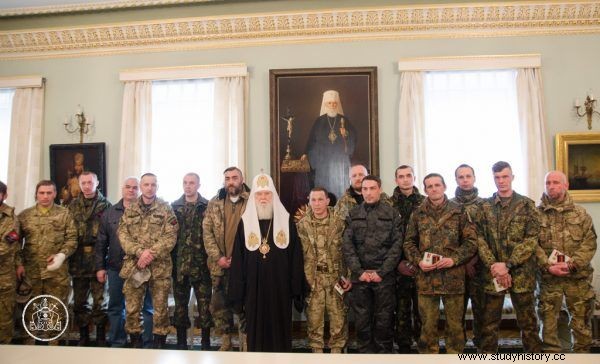
Volunteer troops of the Right Sector willingly cooperate with Chechen forces. Photo from a visit to Patriarch Filaret's battalion (source:Kiev Patriarchate, public domain).
Another Chechen branch in Ukraine is called "Sheikh Mansur" (named after an 18th-century Chechen fighter) and interacts with units of the nationalist Right Sector. In total, three Muslim battalions consisting of Chechens, Uzbeks, Balkars and Crimean Tatars are fighting in the territory of the Polish neighbor. The most valued, however, are the Chechens, who are considered great snipers and scouts.
Neither the Right Sector troops nor the Chechen battalions were included in the regular Ukrainian army. The Kiev authorities emphasize that all Muslims fighting separatists are doing it on their own. They also do not receive any remuneration for this. It is unofficially known that the Ukrainian government fears a situation in which voluntary units, dissatisfied with the state of affairs in Ukraine, will one day go to the capital and carry out a coup .
Russia - the common enemy
The battalion named after Dudayev is not an exclusively Muslim detachment, but includes many Muslims from the former Soviet republics. Chechens, some of whom have joined the ranks of the Islamic State in Syria, are also fighting there. Apart from them, there are also many Ukrainians, Greek Catholics and Orthodox Christians in the battalion. They are all against a common enemy - Russia.
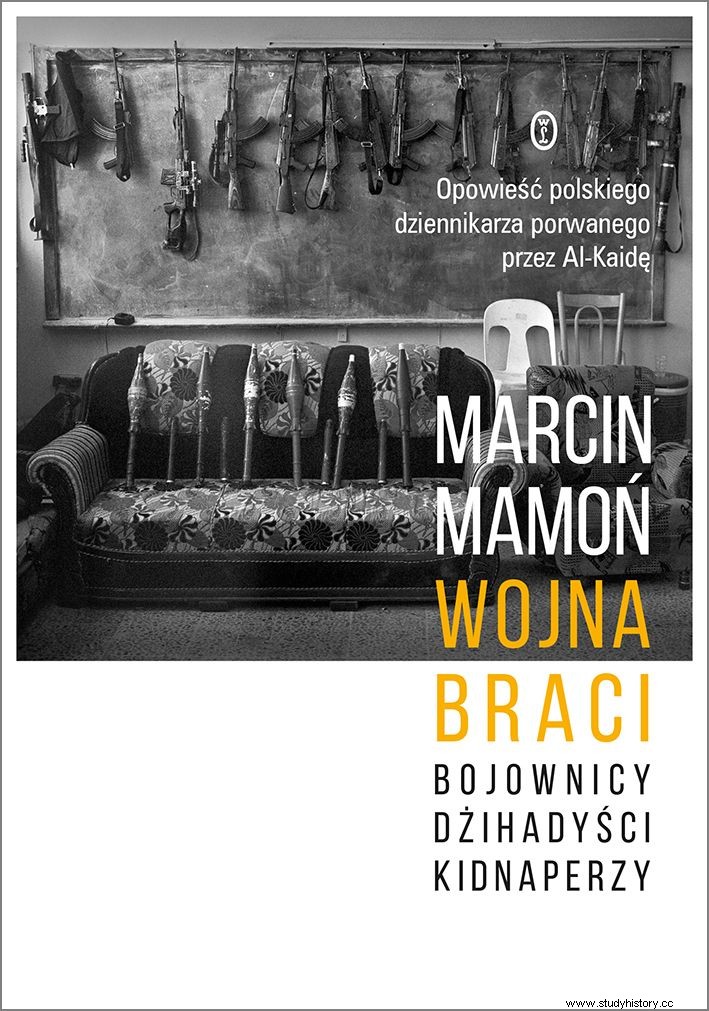
Until his death in February 2015, the commander of the Chechen detachment named after Dudayev was Isa Munaev, an experienced Chechen fighter. He fought, inter alia, in the so-called Debaltsev cauldron. The Ukrainian troops who were in Debaltsev, located in the Donetsk district, were surrounded by the rebels and cut off from the rest of the army. This is the way and goals of Munajew's fight are described by Marcin Mamoń in "War of the Brothers":
He organized regular raids behind enemy lines. It attacked command posts, artillery, rocket launchers and entrenched tanks. Sometimes he stayed in the field for several weeks. Then he would come to the base for a day or two, just to pick up a new group and let those with whom he came to rest . (…) Munajew had a clear goal: " I am defending Ukraine and I am defending Chechnya. If Ukraine is successful, it will be successful in my homeland, Ichkeria.
Chechen-Ukrainian trace
The Chechens fighting the Russians became famous in Western Europe when the French secret services received the news that they had provided weapons to the attackers from Paris. The Islamists who attacked the editors of the Parisian satirical weekly Charlie Hebdo reportedly received supplies from ... General Isa Munaev and volunteers from the Sheikh Mansur Battalion in Chechnya, operating near Mariupol in south-eastern Ukraine.
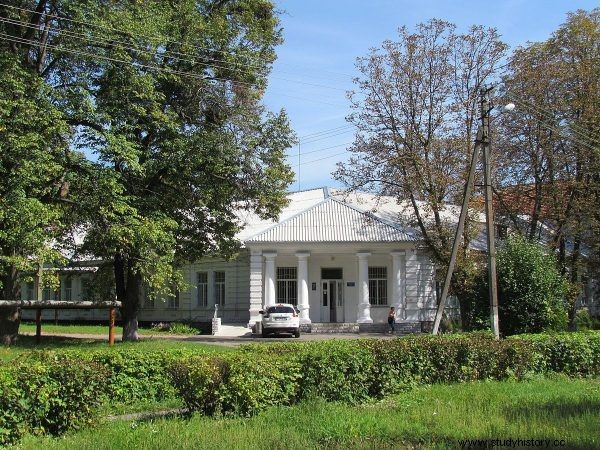
An abandoned psychiatric hospital surrounded by a large park is a great location for a base for a jihadist detachment. The photo shows the building of the hospital complex in Poltava (photo:Vlad2003, license CC BY-SA 3.0).
However, this information is not very reliable. First of all, Munayev was in command of a completely different battalion - the Dzhokhar Dudayev. The general himself emphasized many times that he is not an Islamic fundamentalist and fights only for the independence of Ukraine (and Chechnya).
Accusations of cooperation with Parisian terrorists have also been rejected by the real commander of the Mansur battalion, Emir Muslim Czeberłowski. Chechen fighters in Ukraine would not be able to supply the bombers with weapons, if only because they themselves are struggling with its scarcity. All indications are that the rumor about smuggling weapons was circulated by the Russian services that tracked Chechens.
